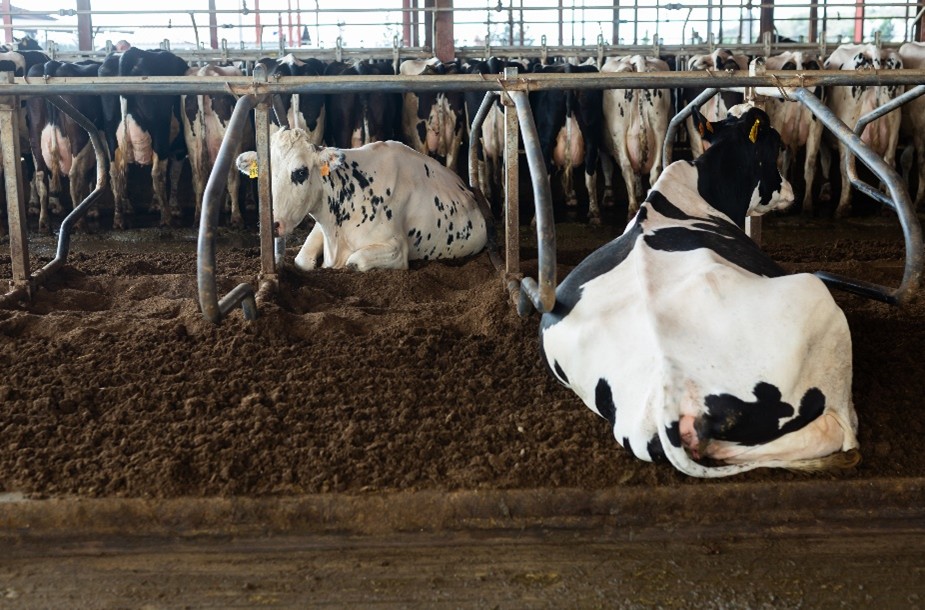A new JDS Communications® study points to digestion plus secondary treatment as the most reliable approach for safer recycled manure bedding with lower counts of mastitis-causing bacteria and other pathogens
Philadelphia, September 30, 2025 – Bedding choice is a crucial factor in both cow comfort and udder health, and dairy farms in the Midwest are increasingly turning to recycled manure solids (RMS) as a cost-effective and readily available option. But because RMS originates from manure, questions remain about whether it can harbor mastitis-causing bacteria or other pathogens. A new cross-sectional study published in JDS Communications explores how different processing methods affect pathogen levels, giving producers clearer insight into the benefits and limitations of RMS bedding.
“Recycled manure solids, obtained by separating the solids and liquids from manure slurry with and without further steps, are increasingly popular as bedding because they are comfortable for cows, economical, widely available, and support circular waste management systems that can help farms boost sustainability,” explained Felipe Peña-Mosca, DVM, MSc, PhD, postdoctoral associate at Cornell University (Ithaca, NY), and lead author on the study. “But questions remain about their potential to harbor bacteria that affect udder health and spread pathogens when RMS are shared between farms.”
The study, led by principal investigator Sandra Godden, DVM, DVSc, professor at the University of Minnesota and co-principal investigator Peña-Mosca, examined 27 dairy farms across Minnesota and Wisconsin that used different RMS preparation systems, including raw or green solids, digester-only using anaerobic digestion without additional treatment, secondary processing only using composting or drying methods, and lastly, processing that used a digester plus a secondary method of composting or drying. The team sampled slurry and bedding materials—before and after each step in processing—and analyzed them for mastitis pathogens as well as Salmonella spp., Mycobacterium avium ssp. paratuberculosis, and Campylobacter jejuni.

Caption: Research from across 27 Midwest farms found pathogen levels in recycled manure solids bedding varied depending on their processing approach, with combined processing showing the lowest levels of pathogens. (Credit: iStock/JackF)
They found that the single-step treatments—digester only and secondary processing only—could reduce bacterial levels of both mastitis and nonmastitis pathogens compared with raw or green solids, but both were still detectable in the final bedding product in many cases. Instead, the clearest improvements came from farms that combined anaerobic digestion with a secondary treatment step, such as composting or drying. In these systems, the researchers saw lower counts of mastitis pathogens, and importantly, did not detect any Salmonella spp. or Mycobacterium avium ssp. paratuberculosis in the ready-to-use bedding samples.
“Our findings suggest that combining digester systems with secondary processing can help reduce pathogen risks more effectively than single methods alone,” said Peña-Mosca. “This approach could help lower the transmission risk not only of mastitis-causing bacteria but also of other highly prevalent pathogens on dairy farms.”
The authors note that the study was observational and limited to summer months, so further work is needed to assess consistency across seasons and farm sizes, along with the economics of these processes for farms. Still, the findings add valuable evidence for producers weighing the tradeoffs of different bedding systems.
“This study provides important information for producers and veterinarians as they evaluate bedding options,” said Godden. “It highlights how processing choices can influence pathogen levels and, ultimately, udder health.”
Notes for editors
The article is "Relationships between method used for bedding processing and presence of mastitis and nonmastitis pathogens in ready-to-use recycled manure solids bedding on Midwest dairy farms," by Felipe Peña-Mosca, Sandra Godden, Erin Royster, Doug Albrecht, Scott J. Wells, Brian A. C. Crooker, and Nicole Aulik (https://doi.org/10.3168/jdsc.2025-0754). The article appears in JDS Communications, volume 6, issue 4 (July/August 2025), published by ADSA and Elsevier.
The article is openly available at https://www.jdscommun.org/article/S2666-9102(25)00083-3/fulltext, and the PDF version is available at https://www.jdscommun.org/action/showPdf?pii=S2666-9102%2825%2900083-3.
Journalists wishing to interview the authors should contact Felipe Peña-Mosca, DVM, MSc, PhD, at fp274@cornell.edu, or Sandra Godden, DVM, DVSc, at godde002@umn.edu.
About JDS Communications
JDS Communications®, an official journal of the American Dairy Science Association®, is co-published by Elsevier and ADSA. The journal publishes narrowly focused, hypothesis-driven original research studies designed to answer a specific question on the production or processing of milk or milk products intended for human consumption. In addition to short research articles, JDS Communications publishes mini reviews—unsolicited, concise review papers. Research published in this journal is broadly divided into the production of milk from food animals (nutrition, physiology, health, genetics, and management) and processing of milk for human consumption (dairy foods). JDS Communications aims for rapid turnaround and a short time to publication. www.jdscommun.org
About the American Dairy Science Association (ADSA®)
The American Dairy Science Association (ADSA) is an international organization of educators, scientists, and industry representatives who are committed to advancing the dairy industry and keenly aware of the vital role the dairy sciences play in fulfilling the economic, nutritive, and health requirements of the world’s population. It provides leadership in scientific and technical support to sustain and grow the global dairy industry through generation, dissemination, and exchange of information and services. Together, ADSA members have discovered new methods and technologies that have revolutionized the dairy industry.www.adsa.org
About Elsevier
Elsevier is a global leader in advanced information and decision support. For over a century, we have been helping advance science and healthcare to advance human progress. We support academic and corporate research communities, doctors, nurses, future healthcare professionals and educators across 170 countries in their vital work. We do this by delivering mission-critical insights and innovative solutions that combine trusted, evidence-based scientific and medical content with cutting-edge AI technologies to help impact makers achieve better outcomes. We champion inclusion and sustainability by embedding these values into our products and culture, working with the communities that we serve. The Elsevier Foundation supports research and health partnerships around the world.
Elsevier is part of RELX, a global provider of information-based analytics and decision tools for professional and business customers. For more information, visit www.elsevier.com and follow us on social media @ElsevierConnect.